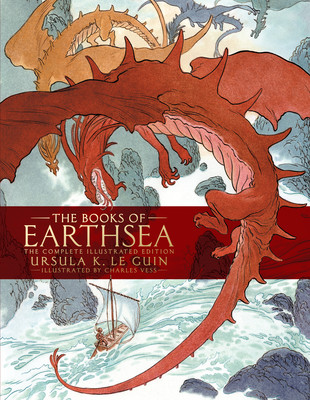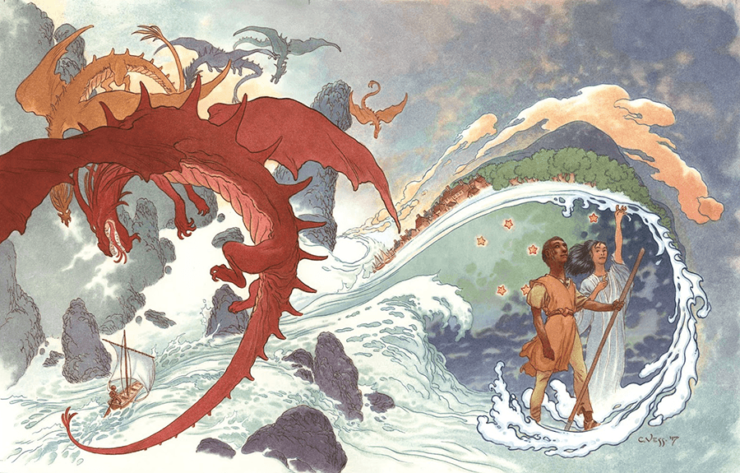This week, Saga Press releases a gorgeous new omnibus edition of Ursula K. Le Guin’s Books of Earthsea, illustrated by Charles Vess, in celebration of A Wizard of Earthsea‘s 50th anniversary. In honor of that anniversary, this week we’re running a different look at Earthsea each day—starting with the first book in the series.
I didn’t meet the book that would make me a fantasy reader under the best of circumstances.
When I was small, 8 or 9, I got very sick with some sort of stomach thing. Nothing would distract me from whatever was twisting my gut. I sprawled on our scratchy, plaid sofa, miserable, unsoothable, probably an absolute terror to be near. My mother, being very smart and very well-read, decided to read to me.
I don’t know if she started with A Wizard of Earthsea, but I know it’s what worked. It was the only thing that worked, a magical spell of distraction and calm—and change, because I was never the same afterwards.
From a very young age, I was a voracious reader, a kid who would get up before the adults and spend hours with my face in a pile of Tintin books. But A Wizard of Earthsea redefined reading for me—what I wanted from stories, and what I got out of them.
There are as many reasons for this as there are pages in Le Guin’s book, but I want to talk about two of them in particular. The first of those is the landscape of fantasy.
I grew up in Oregon, in a world of damp trees, bright rhododendrons, climbing wisteria and green apples that we always ate before they were truly ripe. The Pacific, with its cold and rocky beaches, was an hour away along a winding two-lane road. We lived in a valley, the older, worn-down Coast Range on one side and the Cascades, full of towering snowy peaks and sleepy volcanoes, on the other.
Duny, the smith’s boy who grows up to be Ged the wizard, begins his story on a rocky island called Gont, “a single mountain that lifts its peak a mile above the storm-racked Northeast Sea.” Earthsea, so aptly named, is an archipelago, a gorgeous word I probably learned from this book. Its islands are often small, sometimes lonely, home to a variety of cultures and tales, but the ones on which we start are no tropical isles. They’re full of hills and forests, waterfalls and mountains.
In my young mind, they looked just like Oregon (but better, because the sea was right there). I grew up when kids still ran off into the woods and didn’t come back until dinner—a singular whistle from my stepfather would call me back through the trees—and I had my own mental fantasy map made up of deer-trails and a distant glimpse of a nearby lake seen from the top of a ridge.
Earthsea let me map what little I knew of our world onto a different world, and in doing that, it made my world bigger. I didn’t know, then, that Ursula K. Le Guin lived in Portland, probably just blocks from my father. I didn’t know that familiarity with the same landscapes I loved probably had something to do with the way Earthsea looked, sounded, felt; that she knew the same damp mornings and breezy summers that I did. But I knew the place, knew the way it looked, knew the way she described it: “Below the village the pastures and ploughlands of the Vale slope downward level by level towards the sea, and other towns lie on the bends of the River Ar; above the village only forest rises ridge behind ridge to the stone and snow of the heights.”
People speak of their doorways into reading, but mine, I think, was a doorway out: I stepped not into a fictional city, a great imaginary library (though how I would’ve loved to meet Lirael, way back then!), a magician’s cave, or a Hobbit hole (that was next), but out into this archipelago, this world of islands and storms. The alchemy was perfect: I recognized the landscape, if not the land, and that gave me the tools to build the rest of it in my mind.
I’ve always been a visual reader; I see the story unfolding in my head like a movie. It skips some scenes and elides faces, but I still remember my versions of the settings of books I read decades ago. And maybe it was this specific book that set me on that path of seeing pictures for words, or maybe it wasn’t, but either way, I’m grateful for it.
I hope that other readers find landscapes they recognize in other works of fantasy. I was lucky that this was my entry point; something else might have been too strange, too unfamiliar, for my story-loving brain in that moment. Dune would’ve been too dry, but maybe those deserts are just the thing for someone who grew up in a sandy, warm place. A tale that started in a city would have been beyond my ability to layer reality onto fantasy; I only knew little Eugene, Oregon, which had no towers, no walls, no crumbling ancient castles.
Everyone deserves to find the landscape of their heart in a book, and I will always be grateful that Le Guin wrote mine.
The other vital part of the first tale of Ged is a little more complicated.
Buy the Book


The Books of Earthsea
I was a kid who hated to be wrong. The phrase “it’s easier to ask forgiveness than permission” is still a foreign language to me; to get to forgiveness, you have to first deal with the fact that someone’s mad at you, and that’s the worst.
But Ged is so very, very wrong. He’s the hero of this story—it belongs to him—but the darkness he flees from, the Shadow he then turns and chases, is a problem of his own making. He summoned it, he brought it into being, and when he finally defeats it, he does so by giving it his own name. He calls it Ged, as it calls him the same.
The fact that this is a story about not being defined or limited by your mistakes took a long time to click for me. Ged is enormously powerful, but power isn’t wisdom, and power isn’t strength. There are no shortcuts to experience, and showing off will get you nowhere. A Wizard of Earthsea, when it comes down to it, is about simply doing the work. The parts of Ged’s story at which he is most content, most assured, he’s doing the work: helping Pechvarry make sturdy boats; studying the names of all things in the Isolate Tower; speaking with Yarrow, the young sister of his old friend Vetch, about the different ways they experience the world.
Would Ged have still become both Archmage and dragonlord if he hadn’t made the terrible mistake he makes at the wizard school on Roke? Did fucking up so grandly, so massively, in the end teach him things he needed to know? Can we take from that a suggestion, both comforting and scary, that our own fuckups are vital parts of who we are?
I think we can. We can, and we’re meant to. Le Guin had an astonishingly clear-eyed grasp of human nature, and could paint a more nuanced portrait of a complicated, flawed young man in 200 pages than most could do in twice that. Ged’s story, now 50 years old, has the weight of myth: it’s a fable about failure, a story I need to repeatedly experience as a reminder that failure is rarely permanent. Turn around. Face the mistake. Name it as yours.
In fantasy, this is literal. It’s a story I seek out again and again: the ones in which our heroes and heroines have to clean up their own messes, or teach themselves new stories about who they are. I imprinted on Ged like a literary duckling; I want to follow stories about people making grand mistakes to all of their bittersweet ends. Fighting an immortal, random evil is one thing. Fighting the things about yourself that you wish you could just walk away from? That’s like the landscape of Earthsea: territory I recognize, and choose to claim as my own.
The Books of Earthsea omnibus is available October 30th from Saga Press.
Molly Templeton is Tor.com’s associate managing editor. When she isn’t reading fantasy, she’s probably rewatching Buffy. You can also find her on Twitter and writing about movies for the Eugene Weekly.










